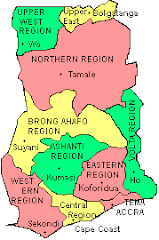Even while in Tamale with all the other Ghana volunteers my head and heart were in Paga with friends, coworkers, and farmers. I remember a few times sitting with the volunteers discussing our placements and what it might be like ‘reintegrating’ back in Canada, while still receiving and making phone calls to friends and coworkers in Paga, like giving an AEA Nadia’s cell number so they could set up a farmer group meeting. Sure I wanted to see my family and friends back home but I just didn’t feel ready to leave.
Here’s some of the reasons (i.e., people) why I didn’t want to leave just yet:
Awudu, Saphia, me,and little Muftawu - they were my family in Paga,
I still talk to Saphia over the phone and we still refer to each other as brotha (nabo) and sista (nako). Saphia and I had some really good conversations and really connected, she taught me a bunch of language and more general life/cultural/social norms. She really was like a big sister always watching out for me and caring, she was definitely the manifestation of Ghanaian hospitality
Fatauh,me and Ayeesha -
her and Saphia always shared a meal with me every night,
and Fatauh walked and talked with me the first night I was
there. By the end we refered to each other as father and son
Michael and me -
He lived in the compound and works a water company so I always refer to him as boss and he does the same with me. We lifted weights together sometimes, he clearly did more often than me proving that not all Ghanaians or Africans are thin and hungry like they show on the news. I also went out with him and the guys for his birthday having some drinks and dancing it up (which they of course found amusing), but he was there if I needed him and helped me out a few times.
Awudu and me -
I always called him 'big boss' because he worked for the water company with Michael and because he's built like a tank. He always responded by calling me 'champion', not sure why but we always had a good laugh about it. We didn't really sit and hang out or talk all the time but he also helped me out all the time, like letting me use his old bicycle, repairing some popped bike tubes, answering any questions I had about social interactions and such. He was like a big brother, which I sometimes called him in local language Kasem, and I always made him laugh by speaking Kasem or basically anything I said or did because after all I'm a strange white guy
me and Kofi -
Even though we didn't run into each other until late in my placement, Kofi and I became pretty good friends. Aside from being a great tailor he's a great guy who's kept a positive outlook on life even though he's had a rough ride so to speak. I'm going to do a separate post about him and few others so I won't get into too many details here, if you're interested I'll be posting more soon.
Vitus, Sarah, and me -
Vitus and Sarah work at the internet cafe which is also a computer training center. Because I was there pretty often posting blogs and sending emails I became friends with the two. Sarah would always randomly say Mr. Brian in a weird pitch that made me laugh, and Vitus and I had some good conversations (I'm also going to post a story about Vitus regarding his life's past present and future which we sat and discussed).
Wisdom -
This my good friend and coworker Wisdom, we became great friends and joked around all the time for some constant good laughs. He's what I call the champion of the Agriculture as a Business program not just because he's following along or something, but because he's a great AEA and has been using the program to really benefit farmers. He's fully capable of running the program on his own and has contributed important feedback to us on what works and what doesn't, what areas it can improve on, and so on. Wisdom is great at what he does and gives me hope for the future of Mofa's extension services.

This is the Nyania Farmer's Group, Wisdom and I would meet with them every week to discuss different issues involved in the program and others they would bring up themselves. They are serious farmers and are o motivated to improve their livelihoods through their farming business.
This is Wisdom's other group the Zenga Farmer's Group, we would also meet with them every week. This is the group that gave me the chicken and eggs that I mentioned in the last post.
Because of the relationships with people including work, it was tough leaving. It’s not so much that I had unfinished work to do, I know Nadia will do a great job, it’s just that after 4 months I had plenty of momentum going. For example, I felt comfortable with all my coworkers and build some great relationships with them, I was working on getting some more AEAs involved in the program, I was working on getting the local bank involved with our program, and so on. I felt like I had a lot going on and things were happening, like farmers taking initiatives and trying new things to improve their farms and therefore livelihoods (without any handouts). It took for 4months, maybe 3, to get in the zone and feel very comfortable with work, friends, and my home life, and then it was time to leave. It wasn’t easy, but luckily I can (and do) stay in touch with people over the phone. All in all I had a great experience, I learned about on the ground development work and got to experience a different culture and people across the world and for that I’m extremely thankful. Aside from my personal learnings and experiences, the Agriculture as aBusiness program was successfully started in this district and EWB now has some good relationships and reputations with Mofa and farmer groups. With our team of hard working, critical thinking, thoughtful volunteers and staff alongside dedicated, hard working, caring, and intelligent Mofa staff working to assist hard working small scale farmers I see hope. Hope for the majority of people in this area living off a dollar or two per day, hope for the women and men putting in long hours of work often physically demanding for just enough (and sometime not enough) to meet their basic needs, and most of all hope for the young girls and young boys who deserve a future where they are entitled to the same opportunities given to girls and boys in North America or Western Europe. I have hope for Gertrude, Sulemana and all the other young ones:
Gertrude
Sulemana
So, our program isn’t perfect, we have a lot to learn and many challenges ahead, but we realize that this AAB program always needs to change, always needs to improve, and most of all always needs to put farmers and their families first. AAB is working, it is helping some of the Ministry’s staff better assist farmers and some AEAs are using it with little to no help from EWB. The main incentives I saw AEAs working with are an internal drive to help farmers and contributing to food security in their country so everyone has enough to eat and then some. I loved being in Ghana, surrounded by some warm hearted people who are striving for a better tomorrow, working with people who had few resources and moderate to low pay for the large work load they carried, but who still did a great job and put in the time and effort while receiving little to no recognition from their superiors or coworkers. With that said I’m looking forward to applying for a long term placement (1 year) and (God willing, as they say in Ghana) hoping to return to Northern Ghana next summer to work with the Ministry of Food and Agriculture.
This isn’t the end of my ‘experience’ or ‘journey’; it’s really only the beginning, and I know that must sound pretty cheesy but it’s the honest truth. And I’m very thankful for the opportunity and privilege to travel to Ghana and live and work there, but that was only possible because of people like yourselves who donated out of their pockets to help our EWB Windsor chapter raise the money for my placement, and equally (or more) important was all your support, whether is was directly through contacting me via emails, text messages, phone calls, and blog comments or through your prayers and positive thoughts/energy. Even the mere fact of knowing that so many of you were supporting me and wishing me well really made a difference especially during those difficult times where I felt down and out. It’s so incredible how people can positively influence one another and sometimes all it takes is a few kind words to help someone up after they fallen, and believe me I fell down more than a few times overseas but with simple short email or blog comment or phone call I got back up and tried, tried to do what I could. I think that’s all we can really ask of ourselves and one another. We can try, and continue to try so that future generations, the Gertrude’s and Sulemana’s all across the world, may live in more fair and just world without the hardships of poverty…
Thanks everyone for everything you’ve done.
I still have some more stories, photos, and a few videos to share, and I’m open to any comments or questions regarding any aspect of my placement.
All the best,
Brian










































